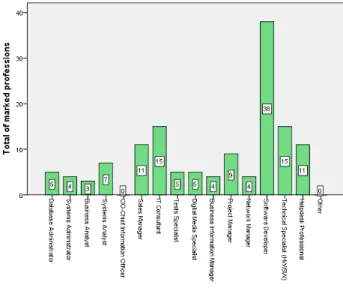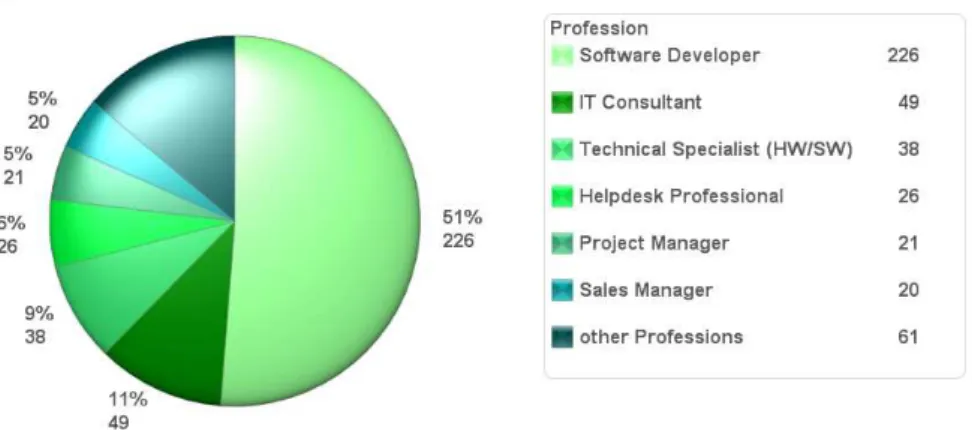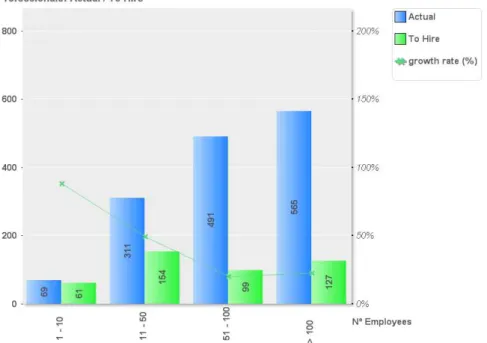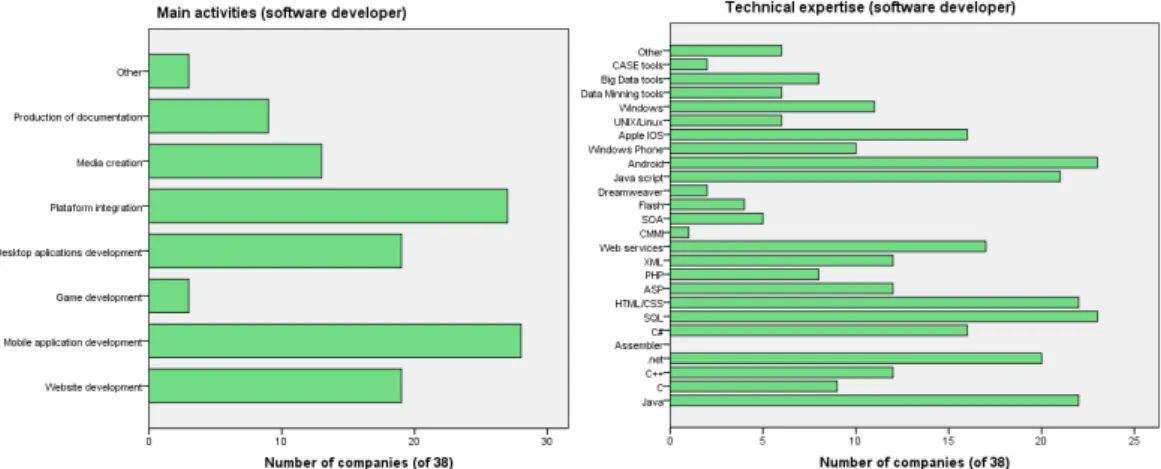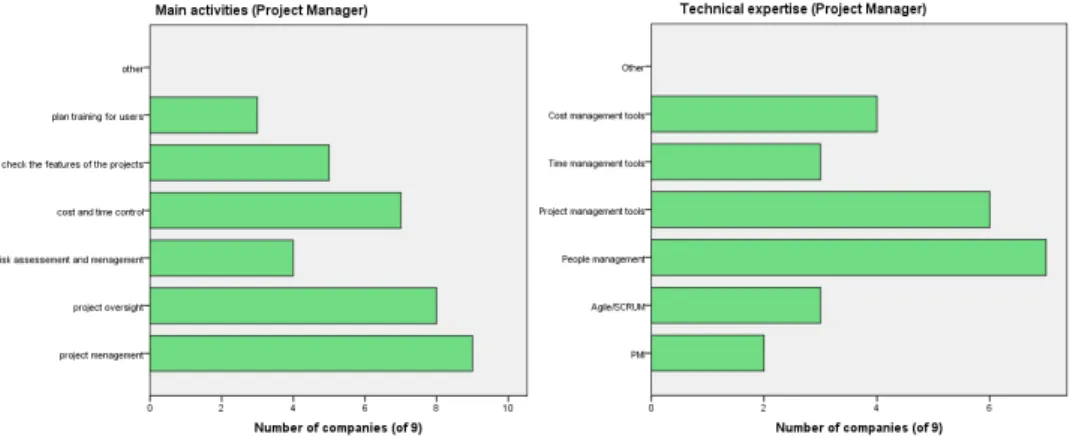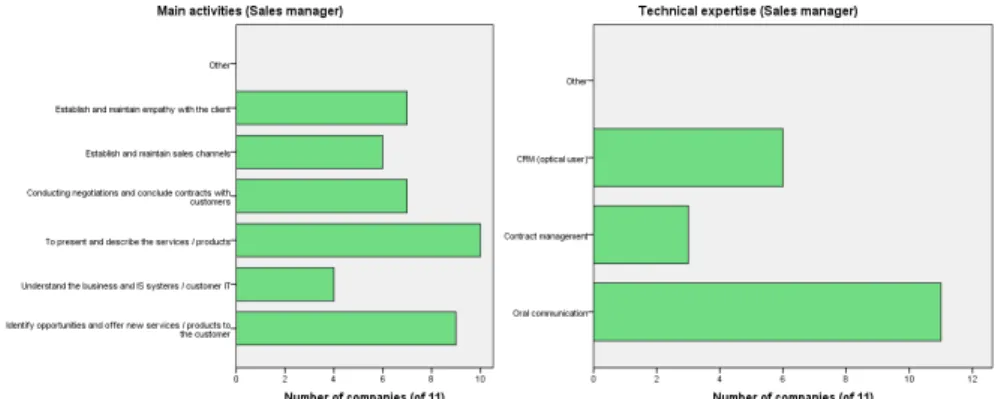SPECIFIC REQUIREMENTS OF HUMAN RESOURCES IN THE ICT
SECTOR IN PORTUGAL
A. Baldaque
1, C. Santos-Pereira
2, C. Azevedo
3, C. Costa Lobo
4, F. Castro
Lopes
5, P. Morais
61
baldaque@uportut.pt, Universidade Portucalense Infante D. Henrique (PORTUGAL)
2carlasantos@uportu.pt, Universidade Portucalense Infante D. Henrique (PORTUGAL)
3cazevedo@mail.telepac.pt, Universidade Portucalense Infante D. Henrique (PORTUGAL)
4
ccostalobo@gmail.com, Universidade Portucalense Infante D. Henrique (PORTUGAL)
5flopes@uportu.pt, Universidade Portucalense Infante D. Henrique (PORTUGAL)
6pmorais@uportut.pt, Universidade Portucalense Infante D. Henrique (PORTUGAL)
Abstract
The strong growth in recent years in the ICT sector has been limited by the shortage in the number of professionals available to fill the growing number of jobs that emerge in this area. This is a particularly serious problem in Europe where the shortage stubbornly persists, despite the efforts made by European leaders over the past decade. Aware of these needs, we carried out a study on the specific needs of human resources in the ICT sector in Portugal in the view of retraining unemployed, in partnership with ANETIE, National Association of Information Technology and Electronics Enterprises. The study began with a search aiming to identify the existing ICT professions, coming to a list of 15 professions applicable in Portugal. Based on several European studies we constructed a list of technical activities and responsibilities associated with each profession.
As the next step a survey was conducted using a questionnaire aimed to gather information about the relevant professions in the ICT sector, the main activities to be undertaken, and the needed skills, not only technical, but also soft, cognitive, business and communication skills.
The results show that the Software Developer is the profession with more number of workers existing in the enterprises from the sample, but it is also the most needed in the next three years. Five other professions should, also, be highlighted as the most needed: IT Consultant, Technical Specialist (HW/ SW), Helpdesk Professional, Project Manager and Sales Manager. The CIO profession was not mentioned by any organization.
Keywords: ICT sector, digital jobs, ICT skills.
1
INTRODUCTION
Despite the high levels of overall unemployment, unfilled vacancies for ICT professionals in Europe are estimated at hundreds of thousands and set to rise over the coming years [7]; Europe might face a shortage of up to 900,000 ICT professionals by 2020 [3]; also in the United States, there is and increasing shortage of individuals with the skills needed to fill the jobs the private sector is creating in this area [11].
To tackle the lack of digital skills in Europe and the thousands of unfilled ICT-related vacancies across all industry sectors, European Commission created, in 2013, the Grand Coalition for Digital Jobs (http://ec.europa.eu/digital-agenda/en/grand-coalition-digital-jobs). The European Commission has proposed a long term e-skills strategy and a Digital Agenda to address the conditions that need to be met to exploit the potential of ICT [5].
The lack of qualified and specialized human resources in the ICT sector affects innovation in this sector and the development of business which are increasingly dependent on ICT. The fact that end-users are also using more digital resources requires organizations to hire more and better specialists in order to meet the market requirements [1]. Also, the constant developments in the ICT field
(including cloud computing, big data, social media, mobile internet, …) create needs for new skills, and big opportunities for those who will generate and master them first [5] .
In recognizing that this skills demand also exists in Portugal, we carried out a study on the specific needs of ICT skills in Portuguese organizations. This study was developed in partnership with
ANETIE, National Association of Information Technology and Electronics Enterprises
(http://www.anetie.pt).
This study aims to understand enterprises ICT skills needs, to assist the education and training providers in planning and developing courses that can also be suited to unemployed retraining, to assist policy makers in developing suitable policies, and to inform all readers of the specific skills necessary in the different ICT professions. A similar study has been also carried out in Ireland [7], [6]. Technical skills are one of several key characteristics of professionals in any field; although, to be successful in any profession individuals will need to demonstrate other kinds of skills, the non-technical skills, generally referred to as "soft skills". The Institute for the Future identifies key work skills needed in the next 10 years, based on the changes that ICT (global connectivity, smart machines, new media, …) are bringing to our lives and the way we work [8]. Considering the importance of these skills the study will also address the relevance enterprises give to them in ICT professionals.
The study was divided into two main parts: an assessment of the ICT and soft skills needs in Portuguese enterprises and the design of a set of courses suited to retraining of unemployed people. In this paper we present the main conclusions of the first part of this study.
The paper starts by briefly introducing the main problem to be addressed. Section 2 describes the methodology adopted and in Section 3 the main results are reported. We end the article, in Section 4, with the main conclusions.
2
METHODOLOGY
The project began with the identification of ICT professions. Based on several studies ([7], [2], [4]) a list of professions was developed. Considering the specificities of Portuguese enterprises, in particular the reality that micro, small and medium size enterprises (SMEs) represent 99.9% of the Portuguese business, we came to a list of 15 professions: Database Administrator, Systems Administrator, Business Analyst, Systems Analyst, Chief Information Officer (CIO), IT consultant, Tests Specialist, Digital Media Specialist, Business Information Manager, Project Manager, Network Manager, Software Developer, Technical Specialist (HW/SW), Helpdesk Professional and Sales Manager.
Based on the same studies, we developed an exhaustive list of technical activities and responsibilities associated with each profession.
Based on the works of ([9],[10],[12]) we define a list of skills to consider in the following types of non-technical skills: soft skills, business skills, cognitive skills, and communication skills.
Soft skills include: assertiveness; attention to detail; confidence; self-control; ability to listen; ability to question; ethical commitment; availability for lifelong learning; time management; initiative; motivation; persistence; planning - action; interpersonal skills; tolerance to stress; decision-making and teamwork. Business Skills include: autonomy; development of others; conflict management; identification of opportunities; influence/persuasion; innovation; leadership; motivation of others; trading; customer orientation and sensitivity to the business.
Cognitive skills include: adaptation to change; self-learning; innovation/creativity; planning/ organization; collection and processing of information and troubleshooting.
Communication skills include: knowledge of foreign languages (English, Spanish, German, French and Mandarin); written communication; oral communication and general culture.
Using the information about ICT professions, activities to be performed, related technical skills and desirable non-technical skills just describes, we develop a questionnaire. This questionnaire was the instrument used in the survey phase of the study to collect the necessary information from Portuguese enterprises.
The first part of the questionnaire aims to characterize the enterprise: headquarters location, number of employees, turnover and activity sector.
The second part presents the list of 15 professions; it intends to collect information about the ICT professions and professionals that exist in the enterprise and the needs for each professional in the next 3 years. It was also possible to refer a new profession existing in the organization.
The third part of the questionnaire aims to gather information about technical activities and responsibilities identified for each profession.
The questionnaire was subject to a pre test which took place between 6 and 14 March 2014. The survey took place between 4 and 17 April 2014.
The questionnaire was made available on a web page; an email was sent to 1287 organizations in the ICT sector, asking for the answer. From this set a sample of 49 organizations was taken; from those 41% are ANETIE partners.
3
RESULTS
3.1 Sample characterization
The majority of the 49 organizations included in the sample is headquartered in Port district, following the district of Lisbon. Regarding the number of employees, 34.7% of the organizations have a maximum of 10, 34.7% have between 11 and 50 employees, 18.4% between 51 and 100 and only 12.4% have more than 100 employees.
With regard to turnover, 30.6% of the organizations have turnover less than € 250,000, 26.5% between € 250,001 and € 1,250,000, 22.5% between € 1,250,001 and € 5,000.000, 18.4% between € 5,000,001 and € 50 million and the remaining more than € 50 million.
It was also found that most organizations, 83.7%, belong to the software industry, followed by e-commerce sector, representing 6.1%, content industry sector, representing 4.1%, and only one belonging in each of the following sectors: training, multimedia and health.
3.2 Main results
As shown in Fig. 1, in the group of 49 organizations, about 78% have Software Developer professionals. Also five other professions are highlighted: IT Consultant, Technical Specialist (HW/ SW), Sales Manager, Helpdesk Professional and Project Manager.
The minimum number of professions referred as existing in the organization was 1, the maximum number was 8 (one organization); most of the organizations (36.7%) had three different professions and the average number of professions existing in organizations was 2.8. It should be pointed that the profession CIO was not mentioned by any organization. No one adds any other profession not existing in the list.
Fig. 2 presents the number of professionals working in a specific profession and those that organizations expect to hire in the next three years; clearly the Software Developer profession highlights.
Fig 2 - Number of existing professionals and professionals to hire
The next figures will present detailed information about the six professions most referred. Fig. 3 and 4 show the number of employees that organizations have in each of these 6 professions and that intend to hire in the next three years. These six professions represent over 86% of the number of ICT professionals to hire.
Fig. 3 – Number of existing professionals and professionals to hire: growth rate
Figs. 5 and 6 show the number of existing professionals and professionals to hire by organizations and the respective growth rate, considering the volume of business and number of employees. In Fig. 3 it is apparent that the growth rate is more pronounced in organizations with lower turnover and as shown in Fig. 4 it appears that the same rate is higher in organizations with fewer employees, what should be expected. The growth rate of employees over the next three years is about 30% which equals an average growth of 10% per year.
Fig. 5 – Number of workers and number of professionals to hire by business volume
Fig. 6 – Number of workers and number of professionals to hire by number of employees
The next figures will present the main activities performed by workers in each of the 6 professions and the technical skills enterprises think they need in each profession.
We begin by the presenting the information of the most referred profession: Software Developer. From Fig. 7 it can be concluded that the most relevant activities to be undertaken by this professional are mobile application development (73.7%) and platform integration (71.1%); game development is relevant only for 7.9% of the enterprises. In addition to the available range of options given, other activities were referred, namely, internal development platform, web applications and software for embedded systems and PLCs / controllers.
Considering the technical skills needed for Software Developers, 60.5% of the enterprises emphasize the android operating system and SQL, followed by Java, HTML / CSS, Java script and .net. No one referred assembler, just one referred CMMI and two enterprises refer Dreamweaver and CASE tools. Other technical skills were also described as needed for these professionals: Visual Basic, Delphi XE5, languages used in specific manufacturer systems (Siemens, Schneider), Scala, Windev and Ruby on Rails.
Fig. 7- Activities to be undertaken and technical skills valued for Software Developer
With regard to the most valued soft skills, 81.6% of the enterprises refer teamwork and the availability for lifelong learning (76.3%). Decision making (28.9%) was the less important. Autonomy, customer orientation and innovation were the most relevant business skills for 78.9%, 71.1% and 65.8% enterprises, respectively. With regard to the most valued cognitive skills organizations refer adapt to change (86.8%) and self-learning (86.8%), while collection and processing of information was less valued (39.5%). Skills about foreign languages are important for most of the organizations (84.2%) and general culture is less important (31.6%). English was the language chosen by all organizations as an important language skill.
Fig. 8 shows the results obtained for the activities to be undertaken and the technical expertise needed for IT Consultant.
Fig. 8 shows that all the presented activities were referred as relevant with percentages ranging from 60 to 93.3%, the latter being associated with the activity evaluate ICT solutions. The most valued expertise was CRMs and the less important SCM (only 1 company), ISO standards and UML (two companies). Other technical skills were also referred: Sharepoint and basic IT skills (structure, function, communication, devices, etc.).
All the soft skills, in general, were referred as being important, with percentages varying between 93.3%, for the availability for continuous learning, and 53.3% for self-control. Also noteworthy are teamwork skills with a percentage of 86.7%. All the business skills were also important, with particular emphasis on autonomy and customer orientation, with a percentage of 86.7%, and the identification of opportunities with a percentage of 80%. Less important were the influence/persuasion and motivation of others with a percentage of 46.7%. From the cognitive point of view all the skills were relevant: adapting to change (93.3%), problem solving (86.7%), collection and processing of information (60%). With regard to communication skills, oral communication was the one with more emphasis (86.7%) and general culture was the less valued (40%). English was the language chosen by all organizations. Mandarin and French had only a percentage of 9%.
Fig. 9 shows the results of the activities to be undertaken and the technical expertise needed for the Technical Specialist (HW / SW).
Fig. 9 - Activities to be undertaken and technical skills valued for Technical Specialist (HW/SW)
As shown in Fig. 9 all the activities were quite important with percentages varying between 86.8% and 100% (Identify and solve hardware and software problems).
The most valued expertise is Windows (86.7%), followed by hardware (66.7%) and the least valued is IOS (40%), as can be seen in Fig.11. The need for technical expertise in ERP, Security, Volp, WiFi, was also mentioned.
Teamwork and stress tolerance reached a percentage of 80% with respect to the most valued soft skills; self-control and the ability to question are the less important (33.3%). The most relevant business skills mentioned were autonomy, customer orientation and innovation with a percentage of 80%; the less relevant are development of others (33.3%) and leadership (13.3%). The most valued cognitive skills were self-learning and problem solving with 86.7% and the least important was the collection and processing of information (46.7%). Foreign language and general culture are the communication skills more and less relevant with percentages of 86.7% and 46.7%, respectively. All companies chose English as the most important language, falling to the French and Spanish a percentage of 9%.
Fig. 10 presents the set of activities to be undertaken and the technical expertise needed for Helpdesk Professional.
Fig. 10 - Activities to be undertaken and technical skills valued for Helpdesk Professional Fig. 10 shows that all activities were quite relevant, with percentages varying between 81.8% and 100% (Identify the reason of hardware and software problems reported by customers). In addition to these activities, it was also indicated by a company, the activity report problems to software developer. The most important technical expertise is oral communication and the less valued is typing.
The most relevant soft skills mentioned were teamwork and the ability to listen, with a percentage of 81.8%, followed by the ability to question, attention to detail and willingness to continuous learning with 72.7%. Less relevant was decision making (36.4%). With regard to business skills enterprises refer autonomy and customer orientation with a percentage of 72.7%. Less importance is given to lead with only 9%. Adapt to change and problem solving are the most valued cognitive skills with a percentage of 81.8% and, although, with a percentage of 63.6%, innovation/creativity is the least relevant. As for communication skills foreign languages are the most important (90.9%), being the less general culture (18.2%). English is the language mentioned by 100% of the enterprises and Mandarin, German and French only assigns a percentage of 9%.
Fig. 11 presents the results of the activities to be undertaken and the technical skills needed for
Project Managers.
Fig. 11 - Activities to be undertaken and technical skills valued for Project Manager
As seen in Fig. 11, the most relevant activity was the project management and the less valued training plan for users. In Fig. 11 it is also found that 77.8% of the enterprises think that people management is the most relevant technical skill and PMI is the less relevant (only 22.2% of enterprises).
Teamwork, time management and decision making are the most valued soft skills (77.8%) while the availability for continuous learning is the less relevant. Autonomy, negotiation and customer orientation, with 66.7% percentage, were the most referred business skills and influence/persuasion the less important. For the cognitive skills enterprises highlight problem solving (88.9%), and less important, self-learning and collection and processing of information (33.3%). All organizations have flagged as most important communication skills, foreign languages and no one referred general culture. English was marked by all companies as the most important language followed by Spanish.
Fig.12 presents the activities to be undertaken and the technical expertise needed for Sales Managers.
Fig. 12 - Activities to be undertaken and technical skills valued for Sales Manager
As shown in Fig. 12, the most relevant activity for a Sales Manager is to present and describe the services/products (90.9%) and the less relevant is to understand the business and IS systems/ customer IT. With respect to technical skills all organizations valued oral communication giving less importance to contract management.
Assertiveness (90.9%), initiative (81.8%) and motivation (81.8%) were the most valued soft skills as self-control, ability to question and decision making, all with 36.4%, was the least valued. The most relevant in commercial business skills are autonomy (81.8%), customer orientation (81.8%), trade (81.8%) and identification of opportunities, with a percentage of 90.9%; development of others (9%) is the least valued. Planning/organization (90.9%) and self-learning (81.8%) are the most relevant cognitive skills and innovation/creativity and collection and processing of information the less valued, although with a percentage of 45.5%. As for communication skills, the one that stands out is oral communication (90.9%) in contrast to general education only with 27.3%. English (100%) and Spanish (45.5%) are the preferred languages.
4
CONCLUSIONS
The results show that the Software Developer is the profession with more number of workers existing in the enterprises from the sample, but it is also the most needed in the next three years. Five other professions should, also, be highlighted as the most needed: IT Consultant, Technical Specialist (HW/ SW), Helpdesk Professional, Project Manager and Sales Manager. The CIO profession was not mentioned by any organization.
The most relevant activities to be undertaken by Software Developers are mobile application development and platform integration; the most important technical skills are Android, HTML/CSS and Java.
For the IT Consultant the relevant activities include evaluation and recommendation of ICT solutions, implementation of ICT solutions and promote the use of the existing ICT systems. The most relevant technical skills are CRM and ERP tools, BI and e-business systems.
The most relevant activities considered for a Technical Specialist are to install and configure hardware and software systems, to maintain these systems and to identify and solve hardware and software problems. The most valued expertise is Windows, followed by hardware and the least valued is IOS. For Helpdesk Professionals the most relevant activity to be developed is to identify the reason of hardware and software problems reported by customers. The most important technical expertise is oral communication and the less valued is typing.
The most relevant activity for Project Managers is the project management. Teamwork, time management and decision making are the most valued soft skills for these professionals.
For a Sales Manager the most relevant activity is to present and describe the services/products. Regarding technical skills all organizations valued oral communication giving less importance to contract management.
Considering soft skills organizations think teamwork and ability for lifelong learning are the most relevant. As for the business skills enterprises highlight autonomy and customer orientation. All cognitive skills where considered important, being the most relevant planning/organization and the least self-learning.
Finally and with regard to communication skills, oral communication is highlighted, being English the most important language for every business and in every profession, followed by Spanish.
REFERENCES
[1] Bughin, J., & Chui, M. (2013). Evolution of the networked enterprise: McKinsey Global Survey results.McKinsey Quarterly, 1–10. Retrieved from
http://www.mckinsey.com/insights/business_techonology/evolution_of_the_networked_enterprise _mckinsey_global_survey_results
[2] Competence Framework. (2014). European e-Competence Framework 3.0: A Common European Framework for ICT Professionals in all industry sectores. Retrieved from
http://ecompetences.eu/wp-content/uploads/2014/02/European-e-Competence-Framework-3.0_CEN_CWA_16234-1_2014.pdf
[3] European Commission. (2014). e-Skills for Jobs in Europe: Measuring Progress and Moving
Ahead. Retrieved from
http://eskills- monitor2013.eu/fileadmin/monitor2013/documents/Country_Reports/Brochure/e-Skills_Monitor_Broschuere.pdf
[4] European Commitee for Standardization. (2013). European ICT Professional Profiles (Vol. 20, pp. 1–46). Retrieved from
http://relaunch.ecompetences.eu/wp-content/uploads/2013/12/EU_ICT_Professional_Profiles_CWA_updated_by_e_CF_3.0.pdf [5] European Schoolnet. (2014). THE e-SKILLS Manifesto. Retrieved from
http://eskills- week.ec.europa.eu/c/document_library/get_file?uuid=ace0176a-9950-47a0-ab3d-b94d3015f8f3&groupId=2293353
[6] FIT ICT Skills Audit. (2012). Fit ICT skills audit. Retrieved from http://www.clareguidance.ie/downloads/ITemployer_Skillsaudit.pdf
[7] FIT ICT Skills Audit. (2014). Creating an integrated ICT Talent Pipeline for growth and prosperity. Retrieved from http://fit.ie/fitnew/wp-content/uploads/2014/12/FIT-ICT-Skills-Audit-2014.pdf
[8] Institute for the Future. (2011). Future Work Skills 2020. Phoenix Usa (p. 14). Retrieved from
http://www.iftf.org/uploads/media/SR-1382A_UPRI_future_work_skills_sm.pdf
[9] Jardim, J., & Pereira, A. (2006). Competências sociais e pessoais: guia prático para a mudança
positiva. Edições ASA.
[10] Le Boterf, G. (2003). Desenvolvendo a competência dos profissionais. Porto Alegre: Artmed Edtora.
[11] Microsoft. (2012). A National Talent Strategy. Retrieved from http://news.microsoft.com/download/presskits/citizenship/msnts.pdf
[12] Philippa Thomas, Debra Paul, J. C. (2012). The Human Touch - Personal skills for professional
success. BCS.
